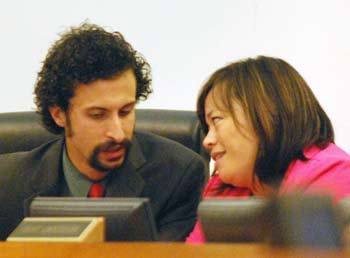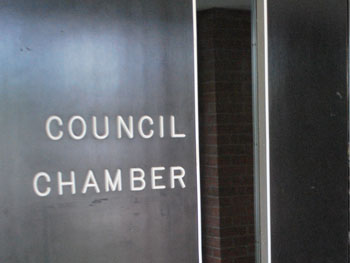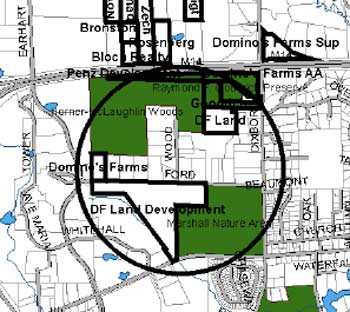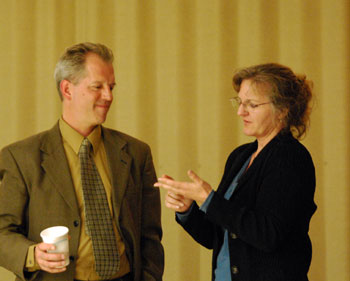Washtenaw County board of commissioners meeting (June 5, 2013): In a move that appeared to surprise many commissioners and staff, Washtenaw County commissioner Alicia Ping formally proposed giving notice to eliminate a lump-sum budgeting approach for the county’s court system.

Board chair Yousef Rabhi and vice chair Alicia Ping. (Photos by the writer.)
After a lengthy and often heated debate, the board voted 5-4 to give initial approval to the notice, but postponed final action until July 10. Voting in favor of initial approval were Ping, Conan Smith, Dan Smith, Andy LaBarre and Kent Martinez-Kratz. Voting against the proposal were Yousef Rabhi, Ronnie Peterson, Rolland Sizemore Jr. and Felicia Brabec.
Ping noted that her goal isn’t necessarily to cut funding for the courts, but rather to be more transparent about where the money goes. The board could ultimately decide to leave the lump-sum approach in place. Giving a notice to terminate the agreement simply gives the board the option to end it.
Conan Smith, who has wrangled with court officials in the past on this issue, argued that the legislative branch is responsible for budgeting, and the board has abrogated that responsibility by agreeing to lump-sum funding. The board gives up far too much authority over line-item expenditures in exchange for “peace in the valley,” he said. “I want to see something different.” With a line-item approach, the county board could indicate priorities for the courts by allocating more funds to specific areas. Dan Smith also argued in favor of the action, noting that the courts are funded with essentially no oversight.
No court officials attended the June 5 meeting. The proposal had not been on the published agenda.
Ronnie Peterson argued most strongly against Ping’s proposal, fearing it would damage the board’s relationship with the courts. Peterson also felt the board itself hadn’t been very accountable regarding a $345 million bond proposal it’s considering. “So as we blast others, let’s prepare to take a few pellets ourselves,” he said. Rolland Sizemore Jr. warned that the board might be starting a fire that they couldn’t put out. He noted that if court officials decide to sue, the county would be required to pay the attorney fees.
Commissioners initially were set to take a final vote at the board meeting that same night – held immediately after the ways & means committee meeting. However, after a break between the two meetings, corporation counsel Curtis Hedger reported that the memorandum of understanding with the courts actually requires a 12-month notice, not the six months that had been discussed. This turned the opinion of some commissioners, who wanted to take more time to study the issue. Andy LaBarre, who chairs the board’s working session, offered to schedule the topic for a working session as soon as possible.
The motion to postpone final action passed on a 6-3 vote, with dissent from Alicia Ping, Dan Smith and Kent Martinez-Kratz. So the proposal will appear on the board’s July 10 agenda.
That July 10 meeting will also include action related to the county’s major bonding initiative to cover unfunded pension and retiree healthcare obligations, including a public hearing. The first public hearing for the potential $345 million bond proposal was held on June 5. It drew four people who all expressed caution about the possible action, with some suggesting a millage or additional budget cuts to cover the retiree obligations instead of bonding.
On June 5, commissioners also set other public hearings for July 10: (1) for two brownfield redevelopment projects in Ann Arbor – at Packard Square (the former Georgetown Mall), and 544 Detroit St.; and (2) for the annexation of industrial property from Scio Township into the village of Dexter. And the July 10 meeting will include final consideration of a strategic space plan for Washtenaw County government facilities totaling about $5 million. The proposals, which got initial approval on June 5, include creating a plan to redevelop the Platt Road site where the old juvenile center was located. The redevelopment might entail a mix of uses, including affordable housing.
A range of other items addressed on June 5 included: (1) creating an historic district for the Jarvis Stone School in Salem Township; (2) an update on the county’s Head Start program, which will be falling under control of the Washtenaw Intermediate School District; and (3) resolutions of opposition – one against gun violence and one against the long-range transportation plan of the Southeast Michigan Council of Governments (SEMCOG). The SEMCOG plan calls for expansion of I-94 in Detroit and I-75 in Oakland County. Some commissioners think that funding should be used to repair existing roads and bridges instead. [Full Story]








